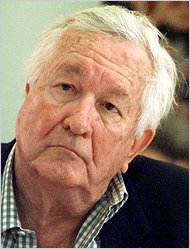
William Styron died at 81 yesterday on Martha's Vineyard. The cause of death was pneumonia, although he had been in ill health for several years. I remember reading Lie Down in Darkness and The Long March back in the sixties and, like many, finding in them echoes of Faulkner, although Styron disdained any attempt to mark him as a "southern writer," and in the end his work did defy any such limiting label. I was most impressed with The Confessions of Nat Turner, published in 1967 and winning the Pulitzer Prize. I was shocked when, after a slew of rave reviews, the book began to draw fire, especially from African-American critics who questioned Styron's right to address the issue of slave rebellion by identifying with Turner. In fact, the book was backed by copious and painstaking research, as was his later novel, Sophie's Choice, a National Book Award winner which was widely praised but like Nat Turner, was criticized. In that case, the beef was that Styron, a non-Jew, wrote about the holocaust by focusing on Sophie--a Polish Catholic rather than a Jew. I have nothing but admiration for his work in both novels. Several years ago I heard Styron speak at the University of South Carolina. To my surprise, he was--some 30 years after the publication of Nat Turner--still defending his decision to write about that topic.
The most recent of his books I've read was Darkness Visible, a wrenching and fascinating description of his intense bouts of depression, which left him utterly immobile. Apparently, this problem commenced when, in 1990 he quit drinking.
Outside his workroom in Connecticut, he tacked a piece of cardboard with a quotation from Flaubert written on it: “Be regular and orderly in your life, like a good bourgeois, so that you may be violent and original in your work.”
George Plimpton interview with Styron in 1968 following the publication of The Confessions of Nat Turner.
No comments:
Post a Comment